
In the first instalment of our new Alumni Spotlight series, we speak to University of Limerick graduate Tomás Heneghan, who made history this year when he won a Supreme Court appeal for his claim that, as a UL graduate, he should be entitled to vote in the Seanad Éireann elections. Here, Tomás shares thoughts on his time at UL and how it sparked his love for Constitutional Law and shaped both his career and passion for activism.
What course/s did you study, and what year/s did you graduate?
I started with a Bachelor of Arts (Joint Honours) in Criminal Justice & Psychology and graduated with that in January 2015. Then I studied the Graduate Diploma/Master of Arts in Journalism and graduated in January 2018.
Why did you choose to study at UL?
At first, I just wanted a university away from home so I could live away from Galway. My sister was already in Cork, so that was a non-runner. When I went to the UL open day in October 2009, I knew within a few hours UL would be the place I wanted to go to college. The campus looked beautiful when I first visited for the open day and the law, psychology, politics, and sociology programmes seemed like a massive draw. I also loved that UL wasn’t in a city centre, like NUIG, Trinity and UCC were.
What were the highlights of your course/s?
I loved law, pretty much for the entire four years of my undergraduate studies. It seemed like no matter what module it was, the lecturers were experts and had a real passion for their subject – whether it was Constitutional Law, Law of Evidence, European Union Law or Jurisprudence. The law was changing so much too at the time, in so many areas, that lectures often reached beyond theory and into the real world we were all living in, there and then.
How did you enjoy your time as a UL student?
I absolutely loved most of my time at UL. Transitioning into university life in first year was very tough, but once I eventually just decided to go with the many new experiences on offer later in my undergraduate studies, I really fell in love with UL. Most of the time then, I would spend hours sitting in Red Raisin with a group of friends – sometimes well into the night, just chatting and working on different assignments. There were also a few nights near the end of first year when I hung around the Living Bridge with friends into the early hours of the morning, just sitting there chatting and watching the river rush through the campus.
Were you a member of any clubs or societies? If so, tell us a bit about your experience!
Yes, I joined a bunch of clubs and societies at the first recruitment drive early on in first year, but only really stuck with one of them – Drama Society. I had done acting as a child and young teenager, and a small bit in secondary school during Transition Year, and I missed it. So, when I joined UL Drama Society, I found my love of acting reignited. I also met some incredible people who are still friends to this day. The first people I ever came out to as gay ended up being four people from the Society.
Near the end of third year, I joined Out in UL and met some wonderful people through that group. Some lifelong friends came from that society. I think my experience in UL wouldn’t have been nearly as interesting or enjoyable without the clubs and societies. Drama Society and Out in UL really gave me the college experience I was looking for when I put UL down on my CAO form.
What are some of your favourite memories from your time at UL?
All the evenings spent in Red Raisin are a time I still miss to this day. It was usually cold, and the chairs were uncomfortable, but being there for hours with friends, with no obligation to buy a coffee or sandwich helped make my final year enjoyable and less stressful. The Christmas celebrations near the Foundation Building and the Main Building were also always a favourite for me. It was great that students, staff, and lecturers could all just go along and enjoy the event together. And I couldn’t not mention the many nights I spent just walking through campus and over the Living Bridge when I needed to clear my head. When everything around campus closes, it turns into an incredibly peaceful and calm place.
At UL, we’re known as the ‘Home of Firsts’ – are there any important ‘firsts’ that you experienced as a UL student, that you would like to share?
UL is where I first really fell in love with the law, and Constitutional Law in particular. But the ‘first’ that stands out more than anything else is coming out. It was at UL that I first told someone I was gay. It wasn’t an easy or fast experience, but UL – and the people I met there – made me feel safe in coming out. And through that, and the ripples it started in my life, I’ve found myself where I am today. UL was also when I first really got involved in a referendum campaign – the 2013 Seanad Abolition referendum – and I’ve been honoured to be able to be involved in numerous historic referendum campaigns since then.
How did your course/s and your overall UL experience prepare you for entering the workplace upon graduating?
While I didn’t end up becoming a solicitor or barrister, I did still end up in a field of work linked closely with the law, and I credit a lot of that to UL. Not only did UL teach me the law and give me a love for that area, the non-academic experiences at UL also helped me grow into a less socially-awkward person, which has helped me massively getting on in life.
Could you update us on where you are now in your career?
I work now as a Data Protection Specialist in the financial services sector, having previously worked in Ireland’s Data Protection Commission for a number of years. It’s an extremely interesting area to be working in at the moment – and since 2018, really – and I know I wouldn’t have ended up here without my initial education at UL.
What are your hopes and plans for the future?
My hopes for my career are to continue learning and developing my knowledge in the area of data protection and privacy. In my personal life, I’d like to write a few books – I’m almost finished the first and now just need to find a publisher – and continue campaigning and advocating for democratic reforms like an expansion of the Seanad and other electoral franchises. I’d obviously love to vote in a Seanad election (the sooner, the better) and someday hit the 100th blood donation mark – at 21 donations now though, I’ve a fair way yet to go. I’d also really like to someday see a UL graduate on the High Court, Court of Appeal and Supreme Court, and a member of the Seanad elected by UL graduates.
Is there anything else you would like to share?
The only thing left to say is that education is freedom. I entered UL on the Access programme and was only the second person in the history of my family – direct and extended – to graduate from university. For a significant period of my childhood, I was kept out of education and couldn’t read or write for many years. But it was only when I returned to education that I really started to grow. And it was third level education that opened my world up and gave me the opportunities I’ve had since entering university first in 2010. Education, at all levels, has to be accessible to everyone, regardless of means or their background.
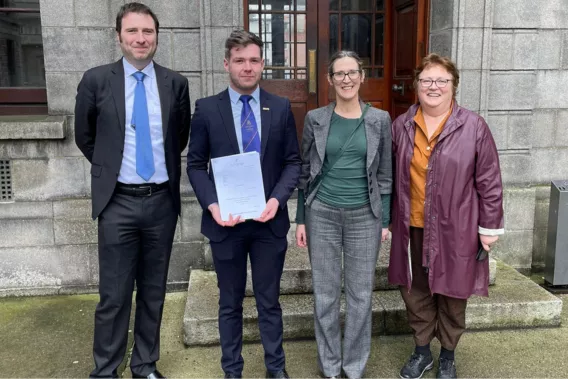
Tomás on the day of the Supreme Court ruling (March, 2023) with some of his legal team - James Kane BL, FLAC Managing Solicitor Sinéad Lucey, FLAC CEO Eilis Barry
Tomás at his MA graduation in 2018 with his father and brother
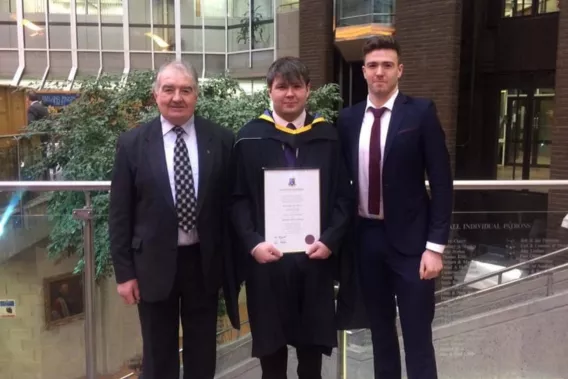
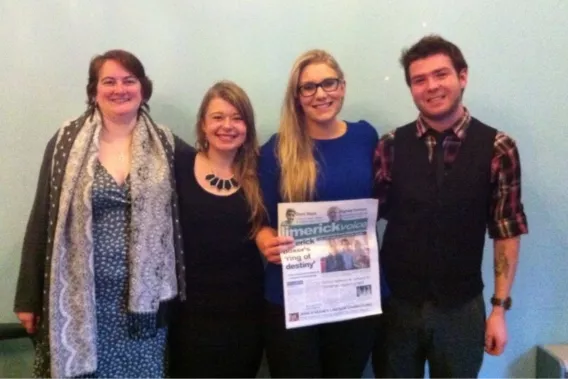
Tomás with classmates Eileesh Buckley, Monika Gaciarz and Aoife Bulfin from the Grad. Dip/MA Journalism course at the launch of the 2014/15 edition of The Limerick Voice at Plassey House
Tomás giving his twentieth blood donation, following two legal challenges to the national blood donation policies
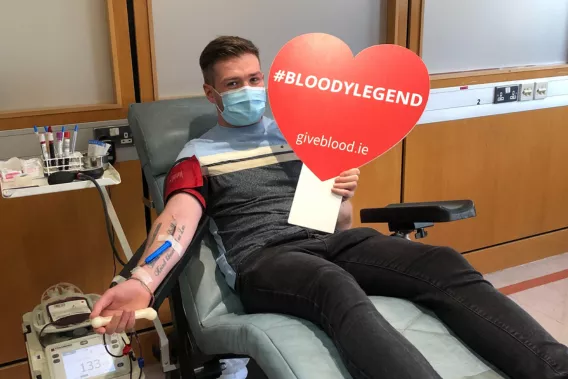
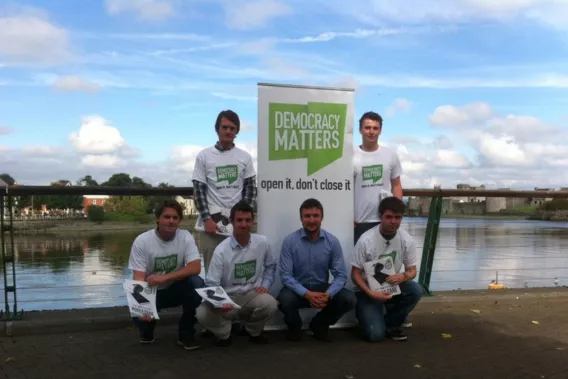
Tomás at a canvass in Limerick, 2013 before the Seanad Abolition referendum